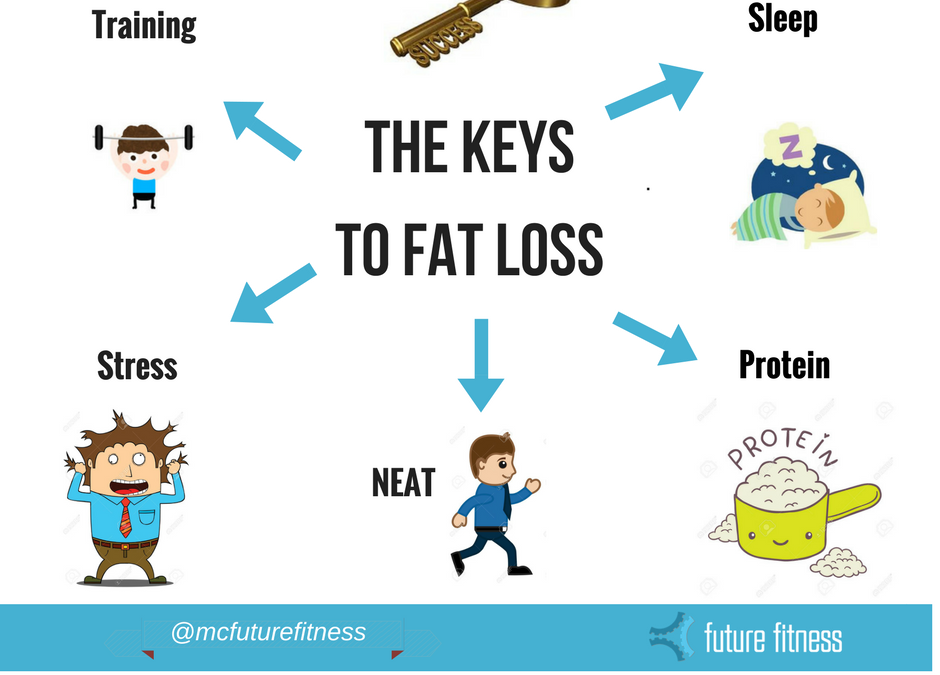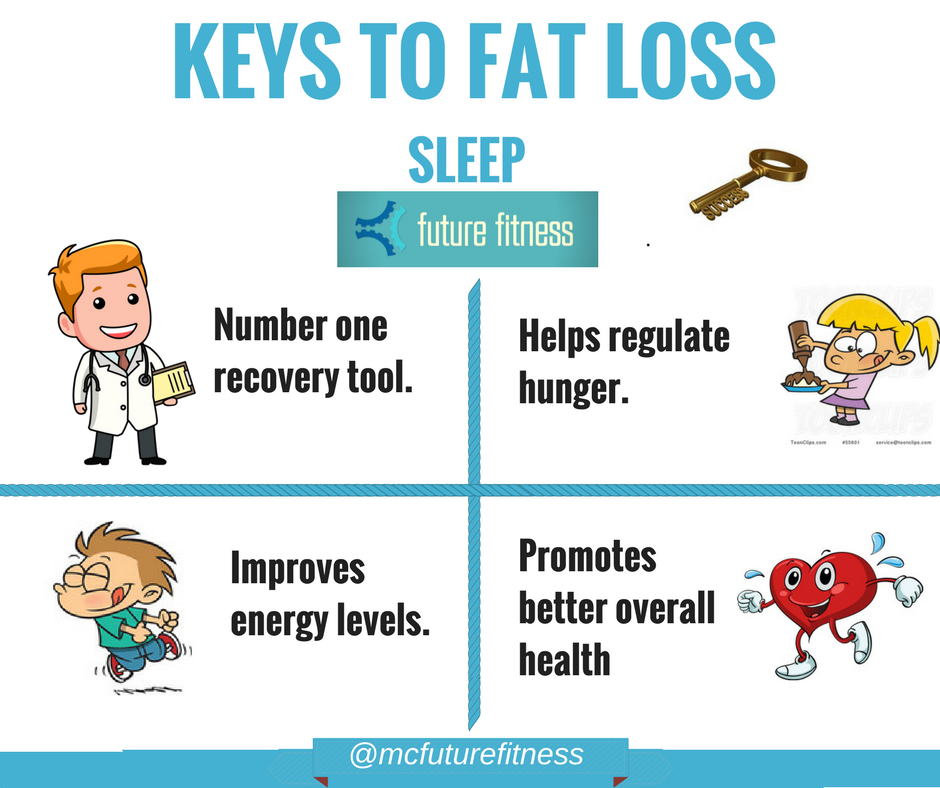Fat loss is hard…
If it wasn’t hard, lots of us fitness professionals wouldn’t have a job!!
In order to lose fat, you must be in a calorie deficit. You need to take in less energy through food than the energy you expend on a daily basis.
You do this consistently over an extended period of time and you will lose fat.
Sounds easy right? Find out how much you need to eat and then do it.
Very easy in theory but in the real world it doesn’t work like that. If we were robots, it would be perfect but we’re not. We have lots of other variables besides food that will effect our fat loss efforts.
Below I’ve listed 5 key elements to fat loss.
If you can understand these elements and control them, it will set you up to have a much easier time losing fat.
- Increasing protein intake
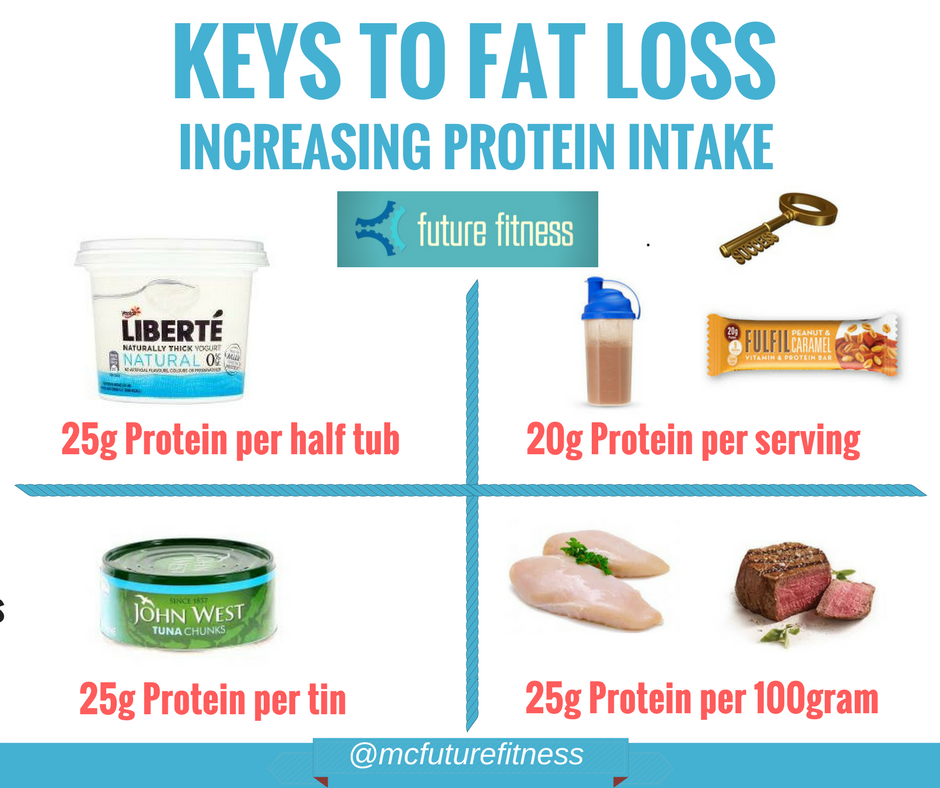
The majority of people that I talk to that want to lose fat, aren’t consuming enough protein. Getting enough protein is vital in order to help you reach your fat loss goals for a number of reasons which I will speak about below.
– It’s the most satiating macronutrient. This means it helps keep you fuller for longer. This is key to help hunger and keep total calorie intake under control.
– Muscle sparing.
Adequate protein will help retain (and in some cases gain) muscle while losing body fat. This is why I said FAT loss not weight loss.
– Higher TEF (thermic effect of food)
Your body burns more energy breaking down protein compared to carbohydrates or fats. Although not a huge amount, every little helps with fat loss.
– Supports recovery, repair and growth.
If you can’t recover, this will effect your ability to train. If you can’t train, you are burning less calories and giving your body more reason to lose muscle not fat.
How can I increase my protein intake?
There are many ways in which we can increase our protein intake. Food sources include chicken, meat, eggs, greek yogurt, tofu and fish. There are also supplements available such as protein powder for those who are really struggling to get enough.
2. TRAINING FOR FAT LOSS
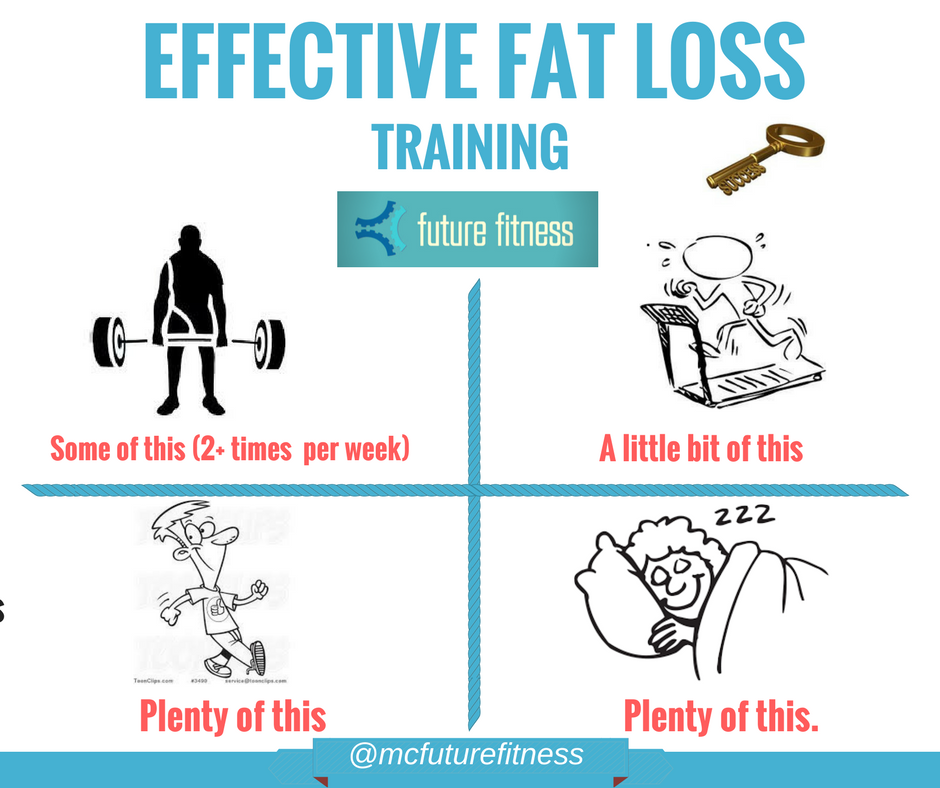
1. Weight Training
– Weight training will not make you big and bulky. Don’t worry i’ve tried, it doesn’t! ![]()
– Weight training will keep your muscle, allowing more weight loss to come from fat.
– Improves your shape. Gives you that ‘toned’ look.
2 + times per week focusing on compound movements that use multiple muscles.
2. Cardio
– You do not need to do hours of cardio a day to lose fat.
– Cardio contributes less than you think to fat loss.
– Can help with overall health.
My recommendation;
Do as little as needed to see fat loss.
Add small increments of cardio if desired to help with overall caloric burn.
3. Being Active
– Increased daily calorie burn.
– Helps recovery
– Reduces stress
– Improves mood
My recommendation;
10,000 + steps per day.
Focus on daily activity levels before worrying about the amount of cardio you’re doing.
*If you add in 1 hours cardio and your overall steps decrease, it defeats the purpose.*
4. Sleep
– Key for recovery.
– Helps control stress.
– Helps with hunger.
My recommendation;
Prioritize sleep.
6 to 8 hours per night.
Put away your phone before bed.
De-stress and relax before bed.
3. NEAT (Non exercise activity thermogenesis)
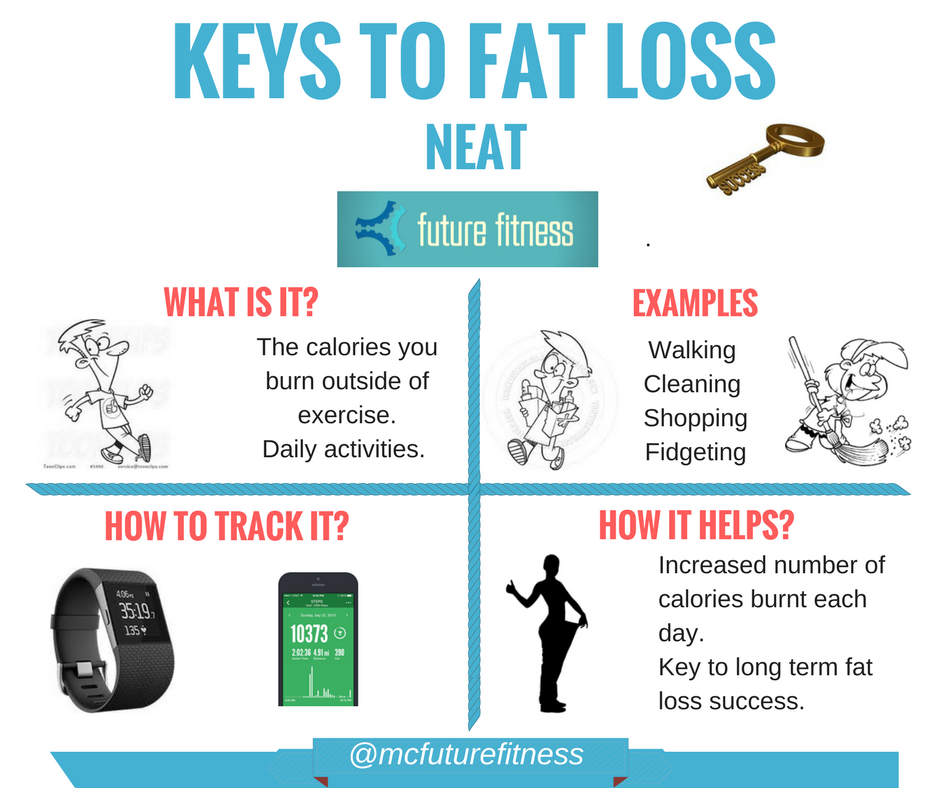
What is it?
This can represent between 15-50% of your total daily energy expenditure.
NEAT plays a critical role in weight management and is a primary factor in people’s tendencies to gain or lose weight.
EXAMPLES
– Walking
(This contributes to the majority of NEAT)
– Standing
– Sitting
– Fidgeting
– Shopping
– Cleaning
Does it really make a difference?
Studies have shown there is a difference of around 120 calories per hour burned between someone resting and somebody walking at 1mph. (Keep in mind 1mph is literally barely moving)
You times this by a typical 8 hour work day.
120 x 8= 960 calorie difference in calories burnt.
If your only eating 1600-1700 calories trying to lose fat you can see how much of a difference this can make!!
This is where your daily activities and your job have a massive effect on how many calories you burn per day.
Just by having a more active lifestyle you can burn a lot more calories each day and help with fat loss and overall health.
How to track NEAT?
The most common ways of tracking your daily activity is through activity monitors like Fitbits and apps on your phone.
Tracking your activity forces you to be constantly aware of your activity levels.
By tracking your activity, you can monitor trends and make a consistent effort to improve your NEAT and studies have shown using these can help increase physical activity.
Ways to increase NEAT?
– WALK MORE; To work, at lunch, to the shop ect…
– Take the stairs
– Park further away from the destination
– Get off a stop early and walk
– Buy a dog
– Track steps
– Clean the house more often
– Do more work around the house
– Resistance training
4.) SLEEP
Sleep is something that is often forgotten about and overlooked when it comes to health and wellness.
Your training and nutrition can be on point but if you are not getting enough and getting quality sleep, it can really effect your results whether it be fat loss, gaining muscle or overall health. Probably a lot more than you even think.
Why is sleep so important for fat loss?
– RECOVERY
It’s the number one recovery tool that you have. It’s better than any supplement and its free!! If you are’t getting enough, it will make your recovery a lot harder.
Not being able to recover will effect the amount of work you can do in the gym. If you can’t recover, you can’t train as hard.
If you can’t train as hard, your ability to improve goes down.
-HUNGER
A lack of sleep can cause an increase in cravings and unnecessary hunger.
When you don’t get enough sleep your Leptin levels drop. Leptin plays a key role in helping you feel full.
Not sleeping enough causes a rise in the stress hormone Cortisol which is associated with fat gain. You also see a rise in the hunger hormone Ghrelin. The combination of these rising will increase cravings and impair your ability to feel satieted, making you feel hungry all the time.
As if cravings and hunger weren’t bad enough, a lack of sleep also makes us crave the wrong foods. We don’t want to eat a big salad, you want that chocolate bar instead. It impairs the brains decision making abilities. It’s a lot harder to say no when you are sleep deprived.
As we know when on a diet and trying to lose fat, we want to try and keep hunger levels as low as possible so we can stay in that calorie deficit.
-IMPROVES ENERGY LEVELS
If you aren’t getting enough good quality sleep, it will have a negative impact on your energy levels which can effect your performance in the gym and how much you move in everyday life.
The more energy you have and the more you move throughout the day, the more calories you will burn on a day to day basis. This will help with your fat loss efforts.
-OVERALL BETTER HEALTH
Studies have shown countless benefits of sleep on your overall health.
Ranging from;
– Better mood
– Reduced stress
– Improved memory
– Improved alertness
– Less aches and pains
Links have been seen between insufficient sleep and serious health problems like heart disease, heart attacks, diabetes and obesity.
How much sleep you get effects your hormonal environment in the body. Hormones such as HGH, Testosterone, Leptin, Serotonin, Cortisol, Melatonin, Ghrelin and many more are all effected by your sleep. Fat loss becomes a lot easier when you have these hormones on your your side and working with you not against you.
Tips for getting a good night’s sleep?
– Aim to sleep for about 6-8 hours a night. It is different for everybody, some will function better off 6 where as some need the extra 2 hours.
– Go to bed at the same time every night and get up at the same time every morning (even at the weekend) so that your body gets into a routine.
– Avoid stressful situations before you are trying to go to sleep. Try to have a night time ritual that will help you to relax.
– Sleep in a cool, dark room and avoid all bright lights an hour before you want to switch off.
– Put the phone away and turn off your laptop an hour before you plan to sleep.
– Avoid caffeine as much as possible in the hours before bed.
– Have a high carbohydrate meal as your last meal before you go to sleep.
Foods or food combinations that contain tryptophan, complex carbohydrates, calcium and lean protein are best.
Tryptophan stimulates the production of serotonin.
Serotonin helps the brain calm down, relax and feel sleepy.
Example; Whey Protein, oats and banana is my favorite choice.
PRIORITIZE YOUR SLEEP AND REAP THE BENEFITS ![]()
5. STRESS MANAGEMENT
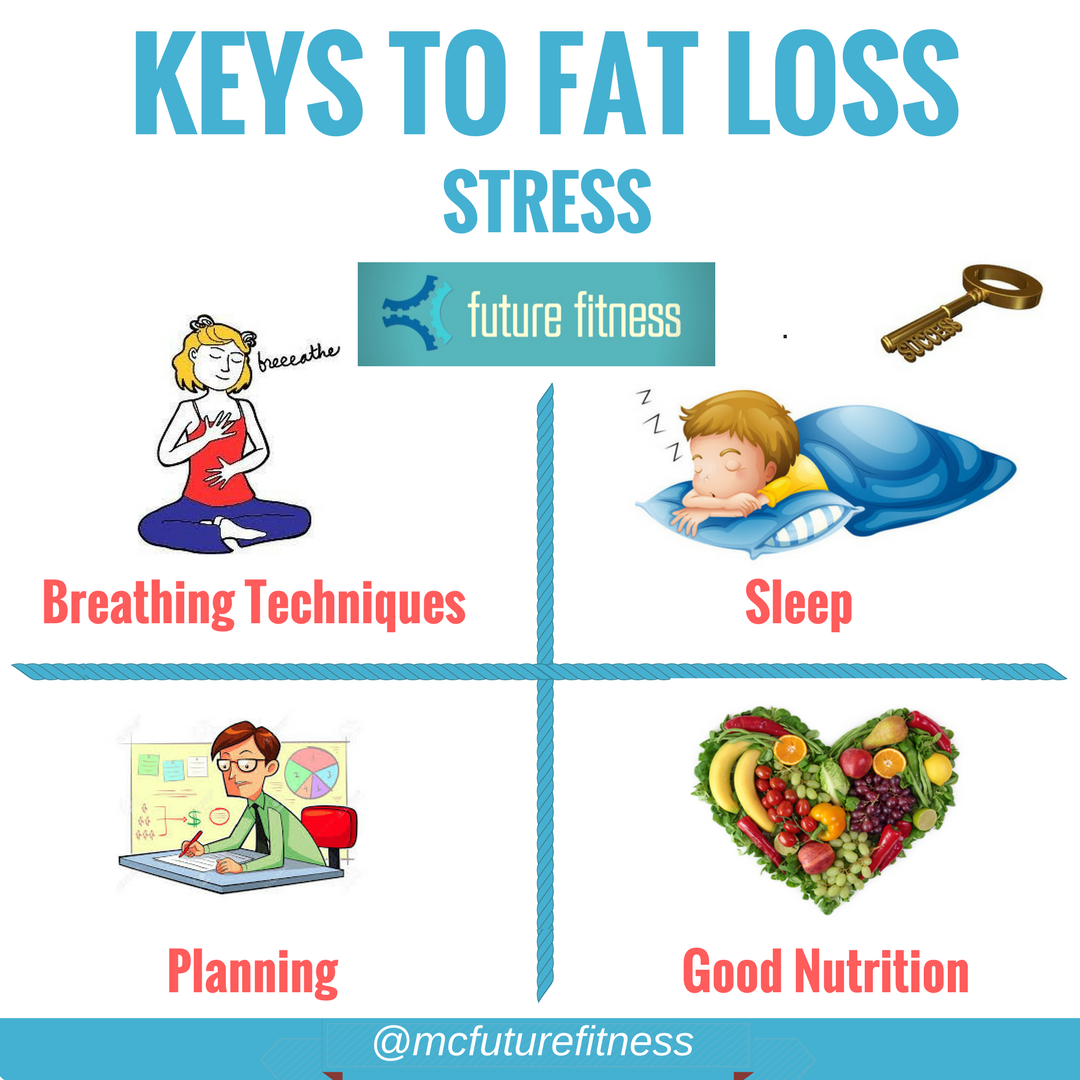
Stress is something that we all deal with.
It can have a major effect on our bodies and weight loss.
How?
– When the stress hormone cortisol is elevated chronically, it can promote fat storage especially around the waist and belly.
– Chronic stress can make you insulin resistant. This basically means your body can’t process and use carbohydrates effeciently. It can stop your body from releasing fat from fat cells.
– Chronic stress can make you Leptin resistant (usually goes hand in hand with insulin resistance) This means your brain can’t read the signal that you’re full so you feel hungry all the time.
– Causes an increase in hunger especially cravings for sugary food as your body wants a quick release of sugar to help bring down your cortisol levels.
– Can effect your sleep. This effects your recovery which increases fatigue.
All the above becomes a viscous cycle for people that can be really hard to get out of and can cause some serious health problems in the long term.
We can’t just get rid of stress, we will always have stresses in our lives. So figuring out ways to reduce stress levels and better manage our stress is key.
Tips for managing stress levels?
– Sleep
Proper sleep (length and quality) will reduce overall fatigue on the body and promote recovery. High stress levels and poor sleep usually go hand in hand for us so focusing on sleep can be very benefical.
(See last post on sleep for more in depth info)
– Planning
Proper planning and organizing creates a less stressful environment. I think we’ve all had those times where we get very stressed telling ourselves “I have a million things to do and i’ll never get them done.”
Then you sit down for 10 minutes, write them all down, plan when to do them, realize half of them aren’t that important and get them all done.
Sitting down and organizing your day takes a lot of pressure off your mind.
– Breathing Techniques
Relaxation techniques such as deep breathing, meditation, yoga etc can help reduce everyday stress, relive tension, improve your mood, physical and mental health.
Deep breathing is one of the best ways to lower stress in the body. This is because when you breathe deeply, it sends a message to your brain to calm down and relax. The brain then sends this message to your body. Those things that happen when you are stressed, such as increased heart rate, fast breathing, and high blood pressure, all decrease as you breathe deeply to relax.
– Nutrition
Eating enough calories and eating a variety of nutrient dense foods is probably the most overlooked thing when it comes to stress management. (IMO) People just don’t realize how important it is and how big a role in plays.
Dieting is a stress in itself so when you are under consuming calories (or over consuming) it places a stress on the body. This is why pairing a low calorie diet with a highly stressful lifestyle never leads to a good end result.
As explained above when you are stressed it effects hunger hormones leptin, ghrehlin and increases cravings for junk food. This can often lead to binges of thousands of calories. This low calorie dieting mixed with sporadic binges is a big stressor on your body and can have huge negative effects both mentally and physically.
By bringing your calories to maintenance levels consistently you will significantly reduce the overall stress on your body. You fill these calories with a variety of nutrient dense food choices and you will feel even better.
Other tips for managing stress?
– Avoid stressful people or situations.
– Take time to relax. We live in a 100 mile an hour world now a days and we don’t take enough time to stop, clear our head. Aim for 10-20 minutes a day.
Conquer these and conquer fat loss;
Increase protein intake.
Train the right way.
Stay active.
Improve your sleep.
Manage your stress.
“We all want to lose fat as quickly as possible. But it’s important you do it properly, because if you do it right, you may have to do it only once.”
– Dr Layne Norton
If you found this article helpful, feel free to share it with anyone else who could benefit from it.
I would really appreciate it.
Coach Matt
Ready to Begin Your Transformation Journey?
Join our online coaching programme

